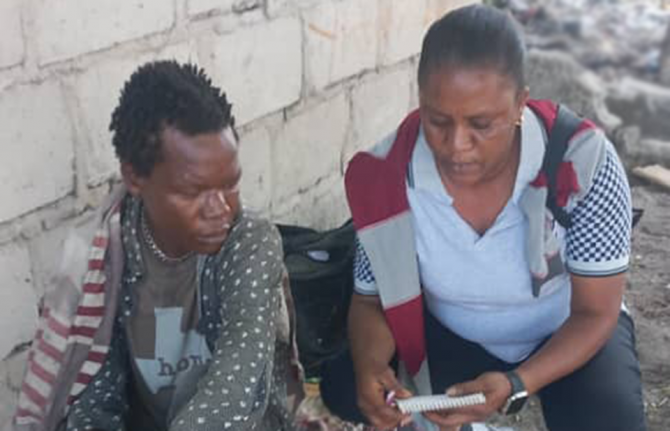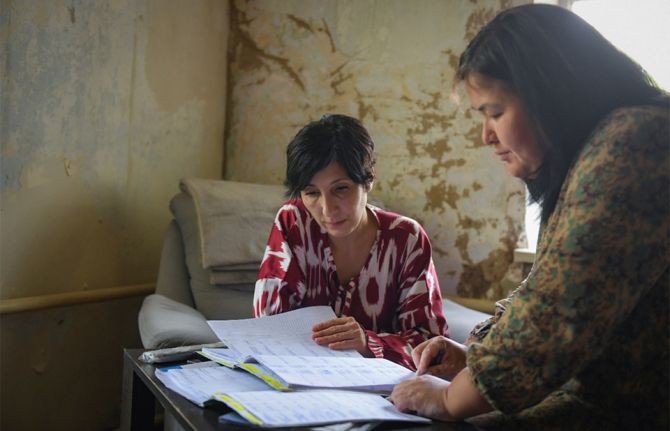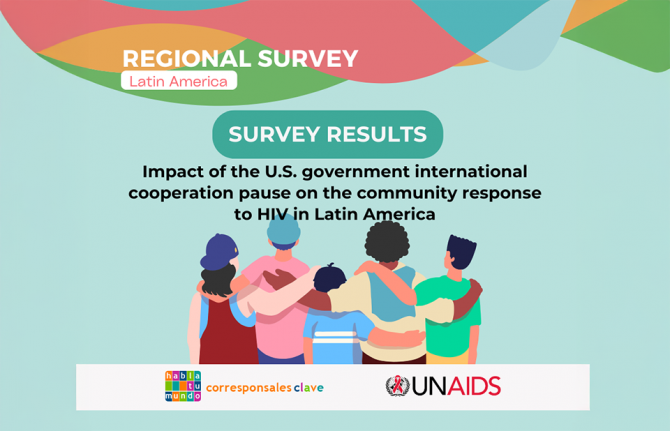
Feature Story
Sweden: standing up for HIV prevention
10 May 2006
10 May 2006 10 May 2006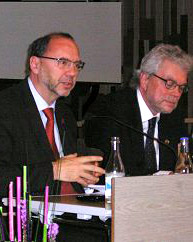
Every day nearly 14 000 people around the world become infected with HIV. This means nearly 5 million new infections a year. An effective response to AIDS requires access to both HIV treatment and prevention. Unfortunately, HIV prevention efforts have for some time been overshadowed by the increased attention on treatment. The complexities of having to discuss sensitive issues such as sex and drugs also contribute to denial and complacency.
Recognizing the importance of HIV prevention as a central part of all AIDS work, the Government of Sweden and UNAIDS invited a group of policy makers, civil society representatives and the media to Stockholm this week to work together towards building a vocal constituency around HIV prevention.
UNAIDS Executive Director, Dr Peter Piot and Lennarth Hjelmaker, the Swedish HIV/AIDS Ambassador.
Hosted by the Ministry for Foreign Affairs and the Swedish Development Cooperation Agency (Sida), in collaboration with UNAIDS and the Swedish Association for Sexual Education (RFSU), the international meeting centered around setting priorities for more effective HIV prevention. This includes giving impetus to HIV prevention; advocating for the effective use of resources available for AIDS and getting all partners to work together.
Giving the global overview of the state of HIV prevention today, UNAIDS Executive Director Dr Peter Piot said, “important progress has been made, but unfortunately it is not enough. Scaling up HIV prevention is critical for the success of the overall response to AIDS.”
Sweden has recognized the importance of emphasizing the importance of HIV prevention. Sweden’s contributions to the AIDS response have increased dramatically in the past few years, and its contribution to UNAIDS in 2006 increased by 33%, from around $ 20.5 million to $ 27.5 million.
Recognizing the importance of HIV prevention is only the first step,” said Carin Jämtin, Minister for International Development Cooperation in Sweden, speaking at the meeting. “Translating the recognition into reality on the ground is something else. To move forward on prevention we need open eyes and open minds.”
Sweden is actively preparing for the 2006 High Level Meeting on AIDS, to be held in New York later this month. Sweden will become the Chair of the UNAIDS Programme Coordinating Board (PCB) at UNAIDS’ next board meeting at the end of June 2006.

Feature Story
New African resolve to combat AIDS, TB and Malaria
08 May 2006
08 May 2006 08 May 2006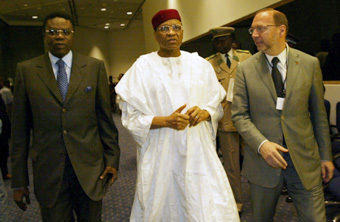
From right: Representative of UN Secretary General, Executive Director UNAIDS, Dr Peter Piot; President of Niger Republic, Mamodou Tandja and President Council of Senate Senegal, Mbaye-Jacques Diop on arrival for the opening session of the meeting of Heads of State and Government at the Special Summit of the African Union on HIV/AIDS, Tuberculosis and Malaria in Abuja
Photo: Sunday Aghaeze
African leaders and Heads of State recently met in Abuja, Nigeria at a Special Summit on HIV/AIDS, Tuberculosis and Malaria to address the challenges posed by the three diseases that kill an estimated four million Africans every year.
Organized by the African Union in collaboration with UN Agencies and other development partners, and at the invitation of Nigerian President Olusegun Obasanjo, the Special Summit adopted the Abuja Call for accelerated action towards Universal Access to AIDS, tuberculosis and malaria (ATM) services in Africa, and a resolution to achieve this by 2010. The delegates also adopted an African Common Position to be presented to the High Level Meeting on AIDS in June 2006.
In the Abuja Call, participants urged for intensified leadership at all levels; further commitments regarding human rights; increased mobilization of resources including negotiations for debt cancellation; and collective advocacy with multilateral and bilateral donors.
African leaders renewed their commitment to allocate 15% of their national budgets to health, and to incorporate health financing plans into national development plans.
“For the first time the political commitment exists to work towards Universal Access to HIV prevention, treatment and care, but getting this will require that once more we change gear and further accelerate the response to AIDS. We have no other options that will save entire societies”, said UNAIDS Executive Director Dr Peter Piot.
Nigerian President Olusegun Obasanjo commended African countries for the progress they had so far made in responding to AIDS, tuberculosis and malaria. The Nigerian leader called for the development of structures and systems guaranteeing better and more transparent utilization of funds, as well as for the development of strategies translating national level goals into community targets.

Press Conference after the closing of the Special Summit (left to right) Alpha Oumar Konaré, Chairperson of African Union Commission and former President of Mali; President Sassou-Nguesso of Republic of Congo, Chairman of the African Union; President Olusegun Obasanja of Nigeria, Host of the Special Summit and Alhaji Mamadou Tandja, President of Niger Republic
Photo: Sunday Aghaeze
Also speaking on the occasion, African Union Commission Chairperson, Prof. Alpha Konare, outlined measures Africa should adopt to successfully deliver AIDS, tuberculosis and malaria services. These include local production of essential medicines, greater mobilization of resources, more efficient utilization of resources, and ensuring access to the most vulnerable groups.
Sub-Saharan Africa has just over 10% of the world’s population, but is home to more than 60% of all people living with HIV - 25.8 million. In 2005, an estimated 3.2 million people in the region became newly infected, while 2.4 million adults and children died of AIDS. Among young people aged 15-24 years, an estimated 4.6% of women and 1.7% of men were living with HIV in 2005.
Related links
Read Statement of the UNAIDS Executive Director Dr Peter Piot at the Special Assembly of Heads of State and Government, Abuja, 4 May 2006
Photo gallery
3 April 2006
4 April 2006

Feature Story
President Putin calls for urgent measures to stem the HIV epidemic in Russia
26 April 2006
26 April 2006 26 April 2006President Vladimir Putin gathered the Presidium of the State Council to discuss the HIV epidemic in Russia. In a groundbreaking move, the State Council examined all aspects of the growing epidemic in the country and agreed on a set of measures that will strengthen Russia’s response to the epidemic in an unprecedented manner.

On 21 April, President Vladimir Putin gathered the Presidium of the State Council to discuss the HIV epidemic in Russia. In a groundbreaking move, the State Council examined all aspects of the growing epidemic in Russia and agreed on a set of measures that will strengthen Russia’s response to the epidemic in an unprecedented manner. “The State Council meeting, chaired by President Vladimir Putin, marks an important milestone in the fight against AIDS in Russia. We welcome the decision to establish a National Commission to coordinate the Russian national response and a scaling up of prevention, treatment and care programmes” said UNAIDS Representative Bertil Lindblad. “The State Council reviewed all aspects of the epidemic and President Putin called for a comprehensive national strategy and the involvement of government ministries, civil society, the media and business".
Russia is facing an HIV epidemic concentrated among groups most at risk. As of today, 342,000 people living with HIV have been officially registered†. Experts believe, however, that this number is considerably higher. The fact that more and more women are contracting the disease and that most of the people living with HIV are under 35 is particularly worrying.
At the opening of the State Council, President Putin emphasized the urgent need of a more efficient AIDS response at all levels. “This is a serious situation that requires us to take the appropriate action. We need more than words; we need action, and the whole of Russian society must get involved. Of course, the people directly involved in dealing with HIV infection should take the lead in this area, but politicians, teachers, cultural figures and the mass media should all play an active part in this work” said President Putin.
The President called for more accurate monitoring of the HIV epidemic and for improved coordination between the federal ministries and agencies in their work. Carrying out preventive work among groups most at risk is considered of vital importance in scaling up Russia’s national AIDS response.

To achieve these objectives, Russia plans to establish a long-term strategy. The previous five-year sub-programme on HIV and AIDS ends this year. Over this period the rate of HIV infection was reduced from 88,000 cases in 2001 to 35,000 cases last year. The national health care project planned significant funding to prevent, diagnose, and treat HIV and viral hepatitis. Over 3 billion rubles ($109 million US) have been allocated for this year alone.
With respect to this, Russia will develop new accurate and objective HIV monitoring tools that meet common international standards. These new tools will enable Russia to make a real evaluation of the causes of the epidemic and the effectiveness of medical and social preventive measures.
The launch of a major wide reaching information campaign has been planned. The programme for the next five years will include prevention measures aimed at groups most at risk and teenagers. A good number of such projects and programmes are already underway in Russia, but they were not yet united by a common strategy.
Finally, the presidium of Russia's State Council has decided to set up a special government commission to review how the country deals with its growing problem of HIV infections. At Russia’s initiative, the AIDS issue has been included on the agenda for the upcoming G8 summit in St Petersburg.
† Source: Presidium of the State Council
Related

Feature Story
Crown Princess Mette–Marit meets UNAIDS staff and UN positive group
25 April 2006
25 April 2006 25 April 2006In her new role as UNAIDS Special Representative, the Crown Princess Mette-Marit made a special visit to UNAIDS secretariat in Geneva to find out more about the epidemic and to meet some of the people involved in the AIDS response. Her Royal Highness will focus particularly on issues of stigma and discrimination as well as reaching out to young people and people living with HIV.
“I am proud to be appointed UNAIDS Special Representative. UNAIDS plays an important role in coordinating the global effort to fight HIV and AIDS,” said the Crown Princess. “Making all powers pull in the same direction is vital in fighting such a complex issue. The UNAIDS staff is notably driven by deep dedication and strong sense of purpose.”
The Crown Princess met with UNAIDS staff of experts, including those living with HIV, and others from the UN System HIV positive Staff Group (UN+). During the meeting she praised the work the staff group is doing, “I am pleased to be with you here today and I believe you are showing leadership with your workplace initiatives at UNAIDS.”
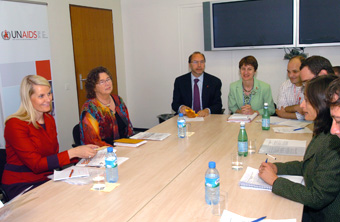
HRH The Crown Princess Mette-Marit of Norway meets with members UN+ (UN System HIV-Positive Staff Group) at UNAIDS Secretariat.
(from left) HRH The Crown Princess Mette-Marit of Norway; Sigrun Mogedal, Norwegian HIV/AIDS Ambassador; Dr Peter Piot Executive Director UNAIDS; Debbie Landey, Deputy Executive Director UNAIDS; members of UN+.
Photo:UNAIDS/O. O'Hanlon
UN+ was formed in 2005 by UN staff living with HIV to give a voice to issues affecting those living with HIV and working in the UN system. Members of the group explained to the Crown Princess the overall aims of UN+.
Goals include contributing to the development and improvement of existing policies on HIV and AIDS at the UN agency level and to create a more enabling environment of all HIV-positive staff members, irrespectively of the level of disclosure of their HIV status.
Her Royal Highness asked the UN+ members about challenges faced by HIV-positive staff when considering disclosing their status to colleagues. “Fear is a big issue for many staff,” explained Kevin Moody. “Fear of discrimination at work and fear of losing your job. We also face a number of other challenges including issues around health insurance and the respect for confidentiality in the workplace.”
The group also pointed out that mobility and travel restrictions imposed on HIV positive people by many countries was a real challenge to employees of international organizations who often needed to travel or relocate for work.
Members of UN+ encouraged the Crown Princess in her new role as UNAIDS Special Representative to remind governments to implement and commit the GIPA Principles (GIPA, Greater involvement of people living with HIV adopted at the Paris AIDS summit 1994). “We want to communicate the value added in the AIDS response when involving people living with HIV and we hope you can help us to ensure the international community takes the principles further,” said another member of the group.
The Crown Princess will attend the upcoming International AIDS conference in Toronto later this year. Among other activities she will seek to include the GIPA principles in her effort to meet the AIDS challenge.
Related links
View photographs of the visit of UNAIDS Special Representative, HRH the Crown Princess Mette-Marit of Norway to UNAIDS
Related
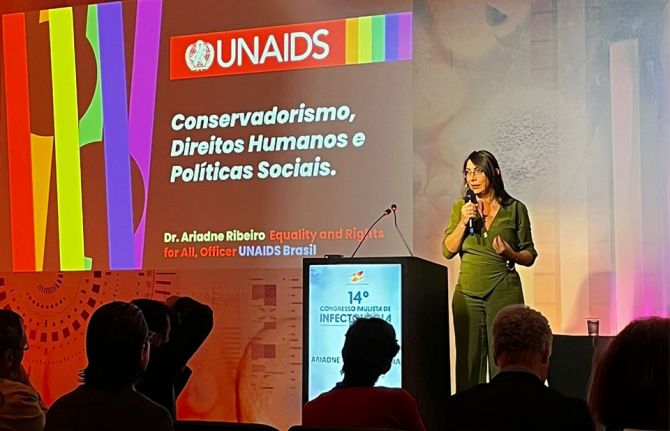 Upholding dignity for everyone: Ariadne Ribeiro Ferreira
Upholding dignity for everyone: Ariadne Ribeiro Ferreira

21 November 2024
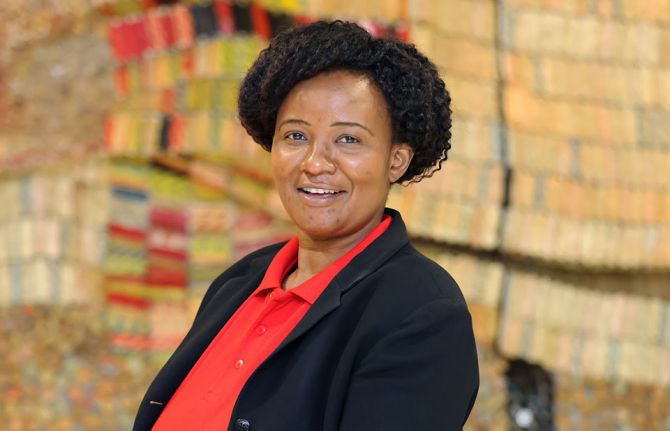 Evelyn Siula: A journey of strength and solidarity
Evelyn Siula: A journey of strength and solidarity
18 November 2024

Feature Story
India: changing lives through TV programming
24 April 2006
24 April 2006 24 April 2006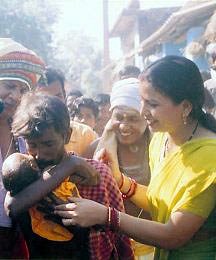
Panchu, holding his daughter for the first time
Nothing can be more devastating for a father than not being able to touch his own children. And that is exactly what happened to Panchu Bhol, a villager in the south-eastern state of Orissa, India. Many men from this poverty-stricken hinterland of Puri district migrate seasonally to Gujarat in search of livelihood. Panchu had also embarked on this migration route, regularly sending money to his family, until he contracted HIV in Surat, the port city of Gujarat.
News of Panchu’s HIV status spread like a wildfire. His family was excommunicated, and his village declared Panchu a curse. Even Panchu himself started to believe it. He lost the courage to pick up his daughter, fearing that he might infect her. Banned from the village life, Panchu cried at his fate, seeing death as the only way out.
But an extraordinary event in December 2005 turned his life around. Panchu still remembers the mild afternoon breeze on the day when the Kalyani team came to his hamlet. Kalyani - meaning the one who provides welfare - is a television health telecast on Doordarshan, the national television of India. Since May of 2002 when it was launched, the program about building positive health behaviors has been reaching nearly 50% of India’s population.
Doordarshan national television is the world’s largest public broadcaster and a signatory to the Global AIDS Media Summit. Providing localized content, Doordarshan produces its key messages in consultation with the National AIDS Control Organisation and the Ministry of Health. Its telecasts feature short spots, folk songs, and informative segments with experts, in an attempt to tackle themes of HIV related stigma, discrimination and treatment. Kalyani program also provides follow up action through expert visits to rural areas to interact with the target audiences.
Actors playing Kalyani characters ‘Sehri Didi and Chakulia Panda’, along with the rest of the Kalyani team, reached Panchu’s village. The team met an emaciated, bearded and confused Panchu. And as the villagers gathered to catch a glimpse of the movie stars, tears rolled out of Panchu’s eyes. It was the first time that someone had visited him since he had been diagnosed with HIV.
Informed of Panchu’s situation, Sehri Didi (the character portraying the sister’s role in the programme) offered to become Panchu’s “sister” in real life and tied him a raakhi, the traditional auspicious red thread. She also shared some sweets with him.
Sehri Didi challenged the villagers not to stigmatize her new “brother” Panchu. An elderly man from the crowd summed up the sentiments of the village: “You told us that HIV does not spread by touching people living with HIV or eating with them. Why should we hate Panchu? We are sorry we did not know this before.”
Panchu was finally accepted. Having learned about means of HIV transmission, Panchu took his daughter into his arms for the first time. For Sehri Didi, accustomed to crying with glycerine on screen, it was difficult to control her tears.
When the Kalyani team visited Panchu’s village three months later, they could hardly recognize him – now a clean shaven and confident young man championing HIV prevention. The doctor treating Panchu thanked the Kalyani team for removing a major hurdle in Panchu’s recovery – the social stigma.
Kalyani program airs in the capital cities of eight highly populated Indian states and there now exist nearly 2,000 community level Kalyani Health Clubs, with close to half million members.
Related

Feature Story
African Union and UN launch bold initiative to scale up HIV prevention in Africa
19 April 2006
19 April 2006 19 April 2006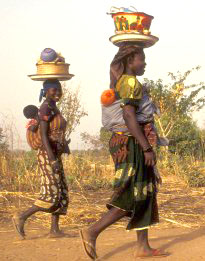
In an attempt to step up the pace of HIV prevention in Africa, the African Union and United Nations launched a new initiative last week to scale up HIV prevention programmes in Africa.
The campaign, which was kicked off in Addis Ababa, Johannesburg, Khartoum, and Ouagadougou, is a follow up to the Declaration adopted by African Ministers of Health in 2005, declaring 2006 as the “Year for Accelerating HIV Prevention in the African Region”.
HIV prevention deserves more serious attention if the goal of coming as close as possible to universal access to HIV prevention, treatment and care by 2010 is to be met. Without effective prevention activities, the impact of AIDS will become even more severe as more people becoming newly infected.
“AIDS responses must be exceptional, but not isolated, requiring balancing of political momentum on AIDS and putting countries in the lead” said UNAIDS Director for Country and Regional Support, Michel Sidibe. He also stressed the need for an appropriate balance between emergency action and long term commitment.
According to UNAIDS, AIDS poses the greatest threat to security and development in Africa. As a result, HIV prevention and treatment should be scaled up urgently. The number of new HIV infections in Africa must be dramatically reduced in the next few years to ensure that treatment, care and support remain economically and socially sustainable.
Despite efforts to fight AIDS in sub-Saharan Africa, 3.2 million people were infected with HIV last year. HIV infections are rising most rapidly among young people under the age of 25 and women.
The African prevention campaign is expected to build a powerful political and social movement that can finally reverse and stop the spread of HIV, which claimed 2.4 million African lives in 2005 alone. Sub-Saharan Africa continues to be the region worst-affected by the epidemic with close to 26 million people living with HIV.

Feature Story
Miss Universe calls on young Russians to get tested for HIV
06 April 2006
06 April 2006 06 April 2006Wearing one of the T-shirts created in the “Designers against AIDS” project, Natalie Glebova, Miss Universe 2005, helped kick start Russia’s Fashion Week 2006/07 and to raise AIDS awareness.
This was Natalie’s first trip back to her birthplace since she moved to Canada at the age of 12. She felt AIDS was too important an issue to miss an opportunity to talk with Russia’s young people about HIV.
“I urge young Russians, who are disproportionately affected by the epidemic, to help prevent the spread of HIV” Natalie said. “By getting tested, learning more about HIV and how to prevent transmission, and being tolerant towards people living with HIV, everyone can make a contribution in the AIDS response.”
Natalie’s recent three-day visit to Moscow included a round table discussion with experts on HIV testing, meetings with policy makers at the State Duma of the Russian Federation, discussions with representatives of the community of people living with HIV, as well as meetings with Russian celebrities and opinion leaders in business and media.
“Misinformation about AIDS, along with stigma and discrimination, is one of the greatest challenges that we must overcome to prevent further spread of the epidemic and improve the lives of people living with HIV,” she said.
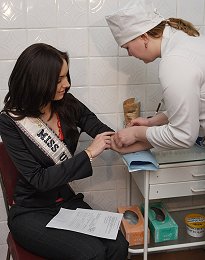
Increasing awareness about AIDS has been the official cause of the Miss Universe competition since 1998. In 2005 Natalie Glebova began her reign with a trip to South Africa where she publicly took an HIV test, highlighting the importance of knowing one’s HIV status. Since then she has continued raising awareness and urging young people – especially young women– to know their HIV status.
“According to the latest UNAIDS estimates, up to 1.4 million people in the Russian Federation are living with HIV. “A striking fact is their young age. 80% of people living with HIV in Russia are under 30, and the proportion of women among new HIV cases is growing fast” said Bertil Lindblad, UNAIDS Representative in the Russian Federation. By contrast, in North America and Western Europe, only 30% of all people infected are under 30.
During her stay in Moscow, Natalie met with people living with HIV to discuss challenges they face and means for improving the situation. She took a public HIV test and attended a confidential consultation at a Moscow clinic, to raise awareness about the importance of access to voluntary and confidential testing and counseling services. She also held meetings with policy makers to discuss how to improve access for Russians to these crucial services.
“Today, information is the only vaccine against HIV. Natalie’s visit to Russia makes a very tangible contribution to raising awareness, reducing stigma and, ultimately, saving lives,” said Avet Khachatrian, Director of Programs in Russia for Transatlantic Partners against AIDS. “Her dedication to the global AIDS response encourages public dialogue about HIV and strengthens the cross-sectoral cooperation that is essential to effectively respond to the epidemic,”
“The fight against AIDS in Russia is a fight to save a generation of young people at risk of getting infected” said Mikhail Rukavishnikov, Director of Community of People Living with HIV. “Natalie is a role model for young people in Russia who may be not aware of the need of getting tested. She is an inspiration and a critical voice for AIDS awareness, tolerance towards people living with HIV and prevention in Russia and worldwide.”
Natalie Glebova also reached out to mobilize the creative community and business circles in Russia to actively join the AIDS response, and raised awareness through media interviews as a spokesperson for the cause.
The visit to Russia was organized by UNAIDS, Transatlantic Partners Against AIDS, The Global Health Council and The Miss Universe Organization.
Related links
Transatlantic Partners Against AIDS
The Global Health Council
Miss Universe Organization

Feature Story
‘Positive partnerships’ break down AIDS-discrimination in Thailand
30 March 2006
30 March 2006 30 March 2006Heralded by UNAIDS as an example of ‘best practice’, a project that offers small loans to enable people living with HIV set up businesses is helping break down stigma and discrimination in Thailand.
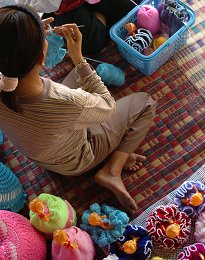
Photo: UNAIDS/O.O'Hanlon
When married mother Nang Noi was told she had HIV three years ago, the fear of the disease and of the social rejection that might go with it was overwhelming. “I cried for five days straight. I did not think I could go on,” she said.
But through her own personal courage, the support of family and friends, and her involvement in a project that has given her the opportunity to set up two small businesses with her sister, Nang Noi has found ways to face her fears and counter AIDS-related stigma and discrimination.
Nang Noi set up two small businesses – selling dried seafood snacks and offering traditional Thai massage – using a micro-credit business loan through Thailand’s biggest non-governmental organization, the Population and Community Development Association (PDA).
Funded by the Pfizer Foundation in Thailand, the PDA project – entitled the ‘Positive Partnership Project’ - offers loans to partnerships of people living with HIV and a ‘’buddy’’(often a friend or family member who is not living with HIV) to set up small business ventures.
As part of the terms of the project, each ‘buddy’ undertakes to be a community ambassador for people living with HIV. ‘Buddies’ talk to friends and neighbors about the realities of HIV, trying to replace fear around HIV with facts.
‘There is a great deal of stigma against people living with HIV - even when it comes to bank loans. A widespread – and unfounded - notion existed in Thailand that people living with HIV wouldn’t be able to pay back loans,’’ said PDA founder, Senator Mechai Viravaidya.
“We felt this theory could and should be tested.”
“We realized that to really make a difference, we needed to tackle the need for people living with HIV to sustain their livelihoods and to break down stigma simultaneously,’’ he added.
Since the official launch of the project in January 2004, around 750 partnerships running micro businesses such as food-selling, motorcycle repair and craft-making have started up, supported by PDA centers in north, northeast and central Thailand. By October 2005, PPP loan repayment rates of 84% exceeded the rate of repayments within the general Thai banking system.
‘’Nobody is more motivated to succeed than the people who are receiving these loans,’’ said Senator Mechai.
Taking charge of their professional lives, people living with HIV involved in the project report feeling an increase in respect shown towards them by others, and a growth in their own feelings of self-respect.
And surveys of community members in PPP project areas indicated that ten months after the loans schemes began ‘anxiety levels’ around (or fear of) AIDS and stigma against people living with HIV had dropped from around 47% to around 14%.
‘’In the beginning our neighbors were afraid to buy Nang Noi’s food. But after I talked to them, and explained the realities of HIV they slowly began to change and now regularly buy from us,’ said Nang Noi’s sister and PPP partner Ngeun.
Patrick Brenny, UNAIDS Country Coordinator for Thailand, underlined the vital role the project plays for Thailand and for UNAIDS work in the country: ‘’Two of the most critical challenges facing persons living with HIV infection in Thailand today are the lack of sustainable livelihoods and the challenges of stigma and discrimination, both of which are priority areas for UNAIDS’ work in Thailand,” he said.
‘”The PPP is an excellent example of addressing the longer-term economic well-being of people living with HIV and their families, while at the same time tackling the community-based stigma and discrimination which hampers the integration of HIV positive individuals and their families into those very same communities,” he explained.
“As more and more people living with HIV in Thailand gain access to antiretroviral therapy through the National Health Security Scheme, the importance of the PPP and similar initiatives will grow in order to address both the economic as well as the social- and community-support challenges facing persons living with HIV infection and their families here in Thailand,” said Brenny.
Related links
Population and Community Development Association
Related

Feature Story
Brazilian designer: condoms, basic as jeans, necessary as love
16 March 2006
16 March 2006 16 March 2006
Photo: Daniel Delaunay
Thousands of condoms pile in the corner. Buckets of paint lie on the shelf. She cuts, twists, shapes, melts, pastes, colors, crochets and sculpts, with her fingers and nails stained black. 365 hours later, a colourful elegant gown made of 6,500 condoms debuts.
Adriana Bertini, a Brazilian artist living in São Paulo, uses expired or defective condoms as raw material to make pieces of art. Her creations include ornate evening dresses, vivid bikinis, elegant shawls, flowery carnival costumes, and other plastic arts.
"I want my art to be visible everywhere, reminding people of the necessity of HIV prevention" Bertini says. “I prefer working more with the figurines, because I noticed that they make people think about the meaning of ‘Wear against AIDS’.”
Bertini started her career at Brazil's fashion houses, and made her first dress from condoms in 1997. Since then, the designer has made around 200 sculptures, 80 tapestries and 160 figurines from condoms. The most condoms she has ever used on a gown - around 80 thousand - was on one wedding dress.
"My idea is to promote condom use not as a commercial fashion but as a conceptual fashion, be it conscious or subconscious. The idea is to wear them at the right time, not just as a trend, on clothes" says Bertini.
Bertini started working in HIV prevention in 1994, after she spent time with HIV positive children as a volunteer for GAPA, an HIV prevention group. "In the beginning, I worked with condoms but not necessarily in the context of AIDS," the designer says "The AIDS issue came along with my work with children living with HIV. I realized that I could use fashion for AIDS awareness."
“I volunteered to do the HIV prevention work,” says Bertini, who at the time did not know anyone living with HIV. “Then I made friends who were HIV positive and this stimulated me even more to promote prevention. Today, I have already lost some dear people to AIDS. I think this is the minimum I can do, being a conscientious person faced with a problem of this magnitude. ‘If you have conscience, act'.”
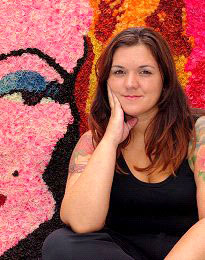
Adriana Bertini. Photo: Rodrigo Cibantos
Bertini’s designs can be seen at fashion shows and in magazines, or are exhibited in museums. “The focus is not on wearing my gowns, but on introducing condoms into everybody’s lives, breaking taboos and giving the public a chance to ponder.”
While Bertini’s designs are often shown in Brazil, she has also had important international exposure. Her work was exhibited at the International AIDS Conference in Barcelona, Spain, in 2002, and at the 15th International AIDS Conference in Bangkok, Thailand, in 2004, among others. She has also proposed an exhibit in the cultural programme of the 16th AIDS Conference in Toronto this coming August: “I am waiting for the selection to be finalized.”
Reactions of the public to her designs vary. Some people whisper about it, others laugh or dismiss it as inappropriate, and then there are those who want to meet her and tell her their problems.
“There a lot of parents who want to thank me because it was through my art that they’ve reached out to their children to talk about sexuality,” she says.
All her material comes from condom manufacturers, and the proceeds from the sales of dresses - prices range from $700 to $5,000 - go directly to organizations involved in the fight against AIDS. Bertini and her HIV-positive apprentices do not make their living directly from their work, but instead rely on sponsors.
"I'm not doing this to make money but rather as a social act, as art aimed at others. I hope that by using condoms to create something new, I can inspire reflection, foster discussion, and challenge taboos." says Bertini who is quickly becoming well-known in international activism circles.
The 34 year-old was awarded with the Nkosi Johnson Community Spirit Award in 2004 by the International Association of Physicians in AIDS Care, Washington DC, (IAPAC) in recognition of her 10 years of artistic activism. "You understand, condoms must become as basic as a pair of jeans and as necessary as a great love," Bertini emphasizes.
Related links
Adriana Bertini official website

Feature Story
Papua New Guinea strengthens its national AIDS response
13 March 2006
13 March 2006 13 March 2006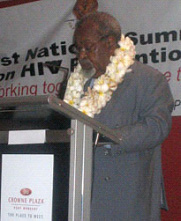
The Prime Minister of Papua New Guinea, the Right Honorable Grand Chief Sir Michael Somare, opened the summit with the key note address.
During the First National HIV Summit recently held in Port Moresby, Papua New Guinea’s Prime Minister reaffirmed a three-fold budget increase for the National AIDS Council to address the country’s growing AIDS crisis.
The Right Honorable, Grand Chief Sir Michael Somare, Prime Minister of Papua New Guinea, called for an immediate expansion of treatment and care for people living with HIV, and urged leaders of civil society, interfaith groups and the private sector to work more closely with the government to stem new HIV infections sweeping the Pacific island nation. “The epidemic is increasing its hold on Papua New Guinea,” he said.
Papua New Guinea has the highest HIV prevalence in the Pacific, with national estimates placing the number of HIV infections at approximately 64,000.
“What has to happen out of this summit is action and more of it,” said Annmaree O’Keeffe, Australia’s Special Representative for HIV/AIDS. She cited the alarming findings of a recent AusAID study which projected that the number of people living with HIV in Papua New Guinea could reach half a million by 2025 if the epidemic is left unchecked.
Public health data in Papua New Guinea indicate that combined factors such as the rising number of STIs, low condom use among commercial and non-commercial partners, as well as domestic violence against women, all contribute to the rapid spread of HIV infection.
HIV is primarily transmitted through heterosexual sex and women aged 15 to 29 are twice as likely to be infected with HIV then men in the same age group, as relationships between young women and older men are common. In remote highland areas, tribal traditions such as arranged marriages also reflect gender inequality issues.
“We have the real potential to lose the women of Papua New Guinea to the epidemic,” said Dr Jacqui Badcock, UNDP Resident Representative and UN Resident Coordinator. “We need to intervene on behalf of women,” she said.
Dr Badcock also stressed that the UN Joint Plan to support the National AIDS Strategic Plan - which includes ARV treatment programs and the Monitoring and Evaluation of HIV and AIDS programs - must adopt the best practices model for HIV prevention.
“The absence of people living with HIV in Papua New Guinea’s AIDS response is one of its greatest weaknesses,” said Maura Mean of the NGO Igat Hope in reference to the absence of any people living with HIV on the National AIDS Committee. She emphasized that people living with HIV must be directly involved in shaping Papua New Guinea’s national policy: “It is time for us to come out of the shadows.”


